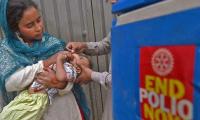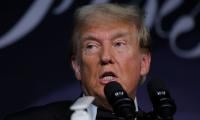TEHRAN: Iran announced on Saturday it had shut non-essential businesses in over half its cities and towns for up to two weeks and introduced movement restrictions to rein in its novel coronavirus outbreak.
The Islamic republic has avoided imposing a full lockdown since it was hit by Covid-19 in February, with President Hassan Rouhani arguing the country’s sanctions-battered economy cannot afford to be shut down for an extended period.
Iran’s coronavirus task force announced on Saturday that only essential services -- including health centres and pharmacies, food shops and public transport -- will be allowed to open in the country’s areas of highest risk, for up to two weeks.
These include more than half of the country’s cities and towns, according to the task force, with Tehran and all other provincial capitals affected by the measures.
Private vehicles are also prohibited from leaving the worst-hit areas until further notice, and are banned from circulating between 9:00 pm and 4:00 am in Tehran and other large cities.
The task force said more than 53 million of Iran’s over 80-million-strong population would be affected by the measures.
President Hassan Rouhani warned that the Islamic republic was facing its "third wave" of infections, and said the new restrictions were a signal to Iranians that the problem is "very serious."
"We call on all citizens to adhere to all the rules, in order to reduce the economic pressure imposed today on businesses as quickly as possible," Rouhani said on Saturday.
"We must convince people that we have no other option," he added.
Iran is the worst-hit country in the Middle East, and its virus death toll has passed 400 a day since the start of November.
The health ministry on Saturday reported 12,931 new daily cases of infection and 431 deaths, bringing the total number of infections to 841,308 and fatalities to 44,327.
Some officials, including from the health ministry, have expressed concern that the real toll is likely to be higher.Meanwhile, Russia on Saturday registered record numbers for daily infections and deaths from the coronavirus, two days after having passed two million cases.Health officials reported 24,822 new infections and 476 deaths, bringing the national total to 2,064,748 million cases and 35,778 fatalities since the beginning of the year.
While those figures suggest a lower death rate than elsewhere in the world, they need to be treated with caution. The official Russian death toll only includes those in which Covid has been established as the primary cause of death after an autopsy.
Data published by Russia’s federal statistics service earlier this month indicated excess deaths of more than 117,000 year-on-year between March and September, suggesting that virus fatalities could be much higher.
Most of the new cases announced Saturday were recorded in Moscow (7,168) and in the country’s second city, Saint Petersburg (2,476), with other regions recording figures in the tens or hundreds.
"We are getting a lot of calls at the moment," Dmitri, a Saint Petersburg ambulance driver, told AFP. "The number of sick people is growing."
The medical team he worked with collecting samples to identify cases visited around 20 addresses every day, he said.
"People are scared, and they are calling for a doctor as soon as they get a little cough," said Lyudmila, one of the two nurses on the team.
On Wednesday, Russian President Vladimir Putin described the surge in infections and deaths as "alarming".
He acknowledged that several regions were experiencing medicine shortages and long waiting times for ambulances, but said authorities were in control of the situation.
Putin called last month for "targeted and justified" measures to fight the spread of the virus, which the regions could take on their own initiative.
Russia in August registered the world’s first coronavirus vaccine, Sputnik V -- named after the Soviet-era satellite -- but before beginning large-scale clinical trials.
Its developers have since reported that interim test results showed the vaccine to be 92 percent effective, slightly lower than its international competitors.
Last month, Putin announced that Russia had registered a second coronavirus vaccine, EpiVacCorona. Russia’s President Vladimir Putin told G20 leaders on Saturday that Russia was ready to provide its Sputnik V coronavirus vaccine to other countries who need it.
Russia is also preparing its second and third vaccine, Putin said, adding that creation of vaccine portfolio was “our common goal”.Almost 12m cases have been recorded. In just one day the US notched up 184,000 new cases – six times the total number of infections in South Korea since the pandemic began.
Almost 80,000 Americans are currently in hospital fighting for their lives, and the death rate is soaring inexorably towards 2,000 a day – close to the peak reached in April.
This week the country passed the grimmest landmark so far: 250,000 dead Americans. And already the total has gone up significantly beyond that tragic milestone.
As Michael Osterholm, a member of the coronavirus advisory team assembled by Joe Biden, put it: “We are in the most dangerous public health period since 1918.”
The result of this terrifying march of untrammeled disease is that panic has begun to set in at state level. Governors and mayors from coast to coast have been scrambling to batten down the hatches, from New York City where the country’s largest public schools system was closed on Thursday barely two months after it reopened, to California where governor Gavin Newsom announced he was “pulling the emergency brake”.
It is in the heartland states that the true horror of the current crisis is unfolding. Here Donald Trump’s historic mishandling of the pandemic is coming home to roost.
John Tinniswood, 111, poses with his certificate from the Guinness World Records, who announced that he is the world's...
Mexico's Foreign Minister Marcelo Ebrard welcomes media workers from Afghanistan during a news conference, after their...
A 3D printed Facebook's new rebrand logo Meta is seen in front of displayed Google logo in this illustration taken on...
Vice President Sara Duterte. — AFP/FileMANILA: The Philippines justice department on Monday labelled Vice President...
A Syrian man collects samples from the site of the suspected toxic gas attack in Khan Sheikhun. — AFP/FileTHE HAGUE:...
A Greek coastguard ship takes part in the search and rescue operation off Samos. — Reuters/FileATHENS: Nine...







